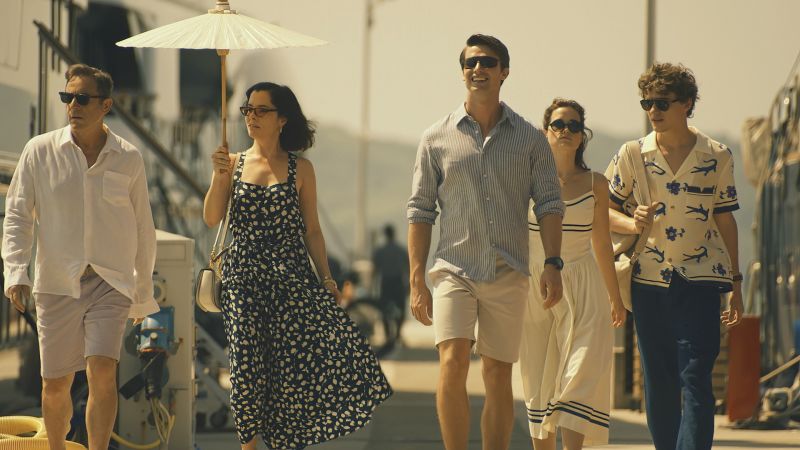15 Best Movies Like Troy
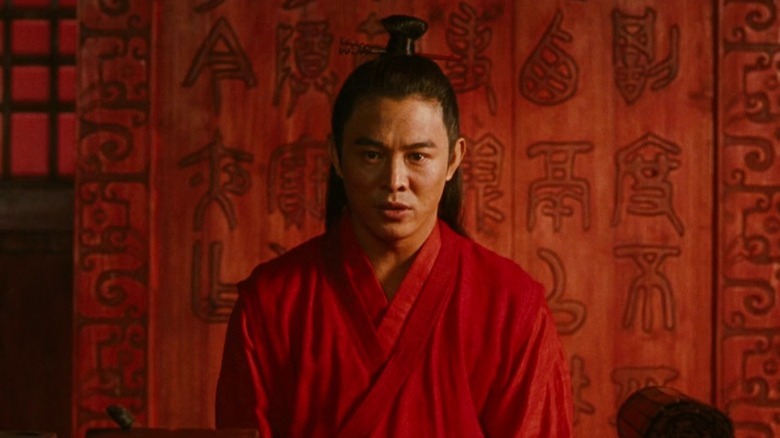
Beijing New Picture Film / Miramax
The 2002 martial arts film "Hero" is considered by many to be the masterpiece of legendary Chinese filmmaker Zhang Yimou, as well as one of the most defining 21st-century entries in the canon of wuxia cinema. The highly stylized, visually splendorous movie is set in the Qin state at the tail end of the Warring States Period between 227 and 221 BC, and tells the story of a nameless prefect (Jet Li) who approaches the King of Qin (Chen Daoming) to tell the story of how he killed and took the weapons of three notorious assassins who had previously made attempts on the King's life.
"Hero" is, simply put, one of the most aesthetically stunning films ever made, as well as a reference point in film history for how a movie can use action sequences and choreography to communicate emotion and themes. For fans of "Troy," it offers the opportunity to revel in a very different period setting recreated just as meticulously, with similarly magnetic stars as the guides, including not just Li and Chen but the likes of Tony Leung Chiu-wai, Maggie Cheung, Donnie Chen, and Zhang Ziyi. Talk about a dream team.
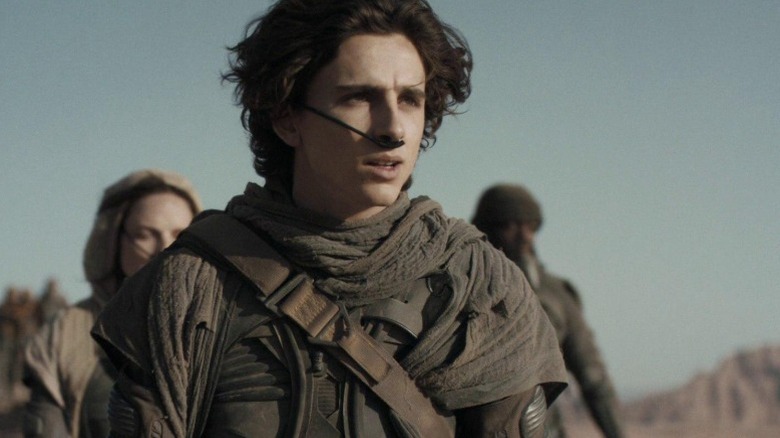
Warner Bros. Pictures
Denis Villeneuve's adaptation of the seminal Frank Herbert sci-fi novel is notable as a kind of late revival of the serious, adult-oriented big-budget Hollywood epic — one that brought a level of poise, scale, and excitement to the multiplex that hadn't been seen in a minute. Set amid an enormous tapestry of interplanetary palatial intrigue, the film adapts the first half of Herbert's original novel and tells of the acclimation of Paul Atreides (Timothée Chalamet), heir to the House Atreides, to the harsh desert planet of Arrakis, to which his father Duke Leto Atreides (Oscar Isaac) has been assigned as the new fiefholder.
Both of Villeneuve's "Dune" films released so far should be of interest to "Troy" fans, especially "Dune: Part Two," a bleaker blockbuster with larger scale and heightened stakes, making it even more of a rollicking good time. At the same time, the "Dune" movies demonstrate what big-budget epic cinema can look like in a darker, more patient, more meditative register, with Villeneuve employing his generational talent in service of full immersion into a world at once overwhelmingly vast and ceaselessly tactile.
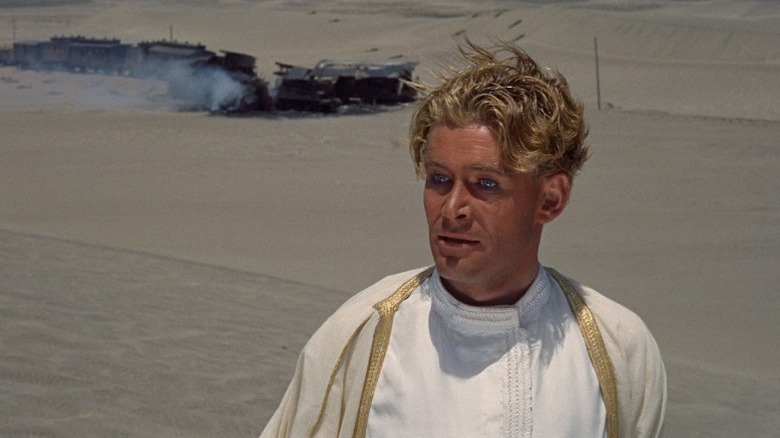
Columbia Pictures
An immensely beloved movie with a perfect Metacritic score and serious candidate for the title of most iconic cinematic epic of all time, David Lean's "Lawrence of Arabia" chronicles the fraught and fascinating life of British Army officer and diplomat T. E. Lawrence (Peter O'Toole), who became a major player in the Arab Revolt against the Ottoman Empire during World War I and ultimately found his allegiance torn between the British Crown and his newfound Arab comrades. Over the course of nearly four patient hours, the seven-time Academy Award-winning film places Lawrence carefully within a complex and ever-shifting historical context while also probing deep into his psyche.
The manner in which Lean and screenwriters Robert Bolt and Michael Wilson unspool the innumerable intricacies of T. E. Lawrence's life, always looking for the underlying tragedy in even his most cinematically thrilling adventures, cast a shadow over every subsequently made Hollywood historical blockbuster — all the way up to "Troy." You won't find another movie with the same sense of sheer scale, be it in the massive scope of the Super Panavision cinematography, in the grandeur of the desert locations, or in the unfathomable human depth of O'Toole's performance. To boot, the subtle depiction of Lawrence's sexuality is, for 1962, surprisingly frank and incisive, which gives it a leg up over "Troy" and its straight-washed Achilles.
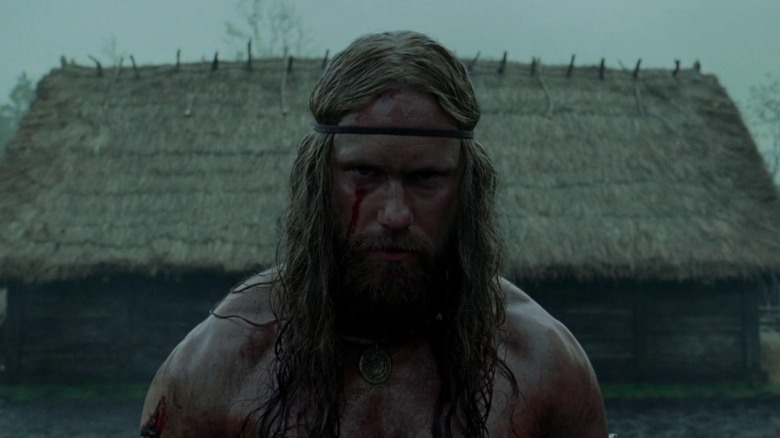
Focus Features
The only Robert Eggers film so far to not fall properly into the horror genre, 2022's "The Northman" still features plenty of chills and thrills. While not very successful at the box office, the film finds Eggers going into blockbuster mode, and splashing his knack for minute period detail across what was, up until then, the largest canvas of his career. Based on the Scandinavian legend that inspired William Shakespeare's "Hamlet" (hence it having the same plot as "The Lion King"), "The Northman" tells the story of Amleth (Alexander Skarsgård), a Viking prince who has vowed to get revenge on his uncle Fjölnir (Claes Bang) for the murder of his father, King Aurvandill (Ethan Hawke).
Watching the movie, it's easy to see what drove Shakespeare to this myth, and even easier to understand what appealed to Eggers in it. To a rare degree among even the most entertaining historical action films, "The Northman" feels passionate — a clear labor of love from a director bursting at the seams with aesthetic inspiration and excitement about bringing a bygone milieu to life. If you're looking for something like "Troy" in a more arthouse vein, no movie will scratch that itch more.
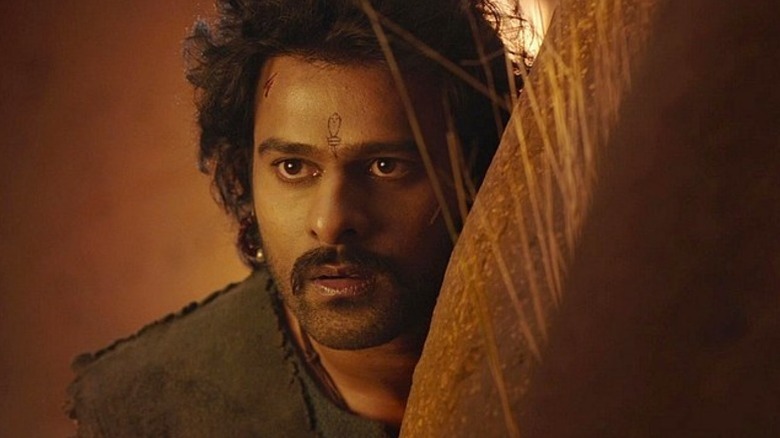
Arka Media Works / Global United Media / Studio Green / Sri Thenandal Films / Dharma Productions / AA Films / Birch Tree Entertainment
Years before the unexpected Western breakthrough success of "RRR," Indian filmmaker S.S. Rajamouli had already flexed his knack for dazzling maximalist period action cinema with the 2015 Tollywood epic "Baahubali: The Beginning." The most expensive Indian film ever at the time of its production, the first movie in the "Baahubali" duology tells the story of Mahendra Baahubali a.k.a. Sivudu (Prabhas), an adventurous young man raised in the mountainside Amburi tribe, who joins the rebellious Avantika (Tamannaah Bhatia) on a mission to overthrow the despotic King Bhallaladeva of Mahishmati (Rana Daggubati).
Loosely inspired by the Sanskrit epic "Mahābhārata" and drawing from various other Indian epic poems, the film occupies a similar aesthetic ballpark to "Troy" in terms of the breadth of its production values and the lushness and crispness of its action sequences. But, of course, there's something distinctly Rajamoulian about the way "Baahubali" tackles the historical epic genre, springing for a level of excitement, creativity, and formal playfulness that feels downright galvanizing. You won't believe how fast the 160 minutes zip by.
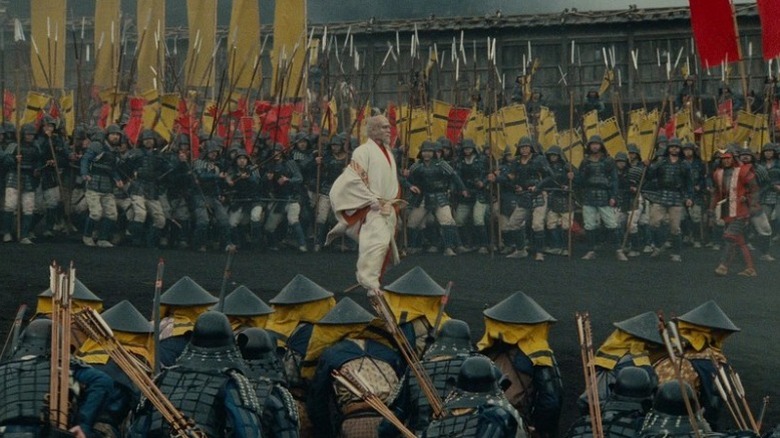
Toho / Acteurs Auteurs Associés / Orion Classics
Some filmmakers settle into smaller-scale, less ambitious fare as they get older, but leave it to master filmmaker Akira Kurosawa to have made the most epic and majestic film of his career at 75 years old. A strikingly-colored 162-minute war drama, 1985's "Ran" is adapted from William Shakespeare like much of Kurosawa's oeuvre — in this case, from "King Lear," with some inspiration drawn from the legend of the 16h-century daimyō Mōri Motonari. Tatsuya Nakadai stars as the aging medieval warlord Hidetora Ichimonji, who decides to divide his kingdom between his three sons., only for that division to sow ambition, war, and tragedy.
It is, simply put, a culmination of Kurosawa's powers as an artist: A film that finds him putting his virtuoso direction in service of an unbound, all-encompassing vision of what cinema can be. The film's action and battle sequences feel like sequences of great, room-sized oil paintings somehow given propulsive life, with Kurosawa displaying a mastery not only of ensemble staging but of light, color, and the elements. It's a self-evident masterpiece even if you're not a huge fan of contemporary American war epics. If you are, however, there are no two ways about it: You have to give it a watch.
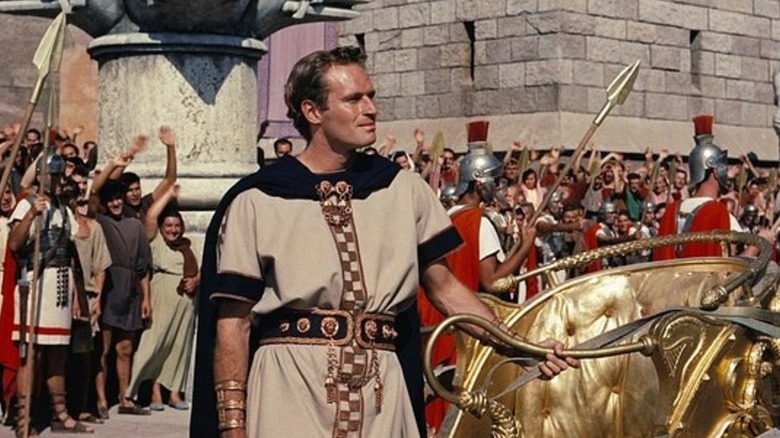
Loew's, Inc.
To this day, the record-holder for most Academy Awards ever won by a single film — equaled twice, but never overcome — belongs to 1959's "Ben-Hur," the massive William Wyler Technicolor epic that catapulted Charlton Heston from bankable '50s star to cinema legend. A record-breaker for movie budgets in its time, Wyler's Judaea-set classic is based on the best-selling 1880 novel by Lew Wallace, and follows the life of Jewish prince Judah Ben-Hur (Heston), who gets arrested and enslaved by the Romans following a betrayal by his Roman friend Messala (Stephen Boyd).
A late example of what large-scale Old Hollywood production could accomplish at its most tasteful and energized, "Ben-Hur" still echoes in all American films about heroes of ancient myth, with "Troy" as one of the clearest examples. But the interest Wyler's film begets is far from just historical. Watched today, it's still a rip-roaring blockbuster featuring some of the most incredible action sequences you'll see in any movie from any period, including a famous chariot race scene that would make a perfectly acceptable pick for most breathtaking set piece in Hollywood history.
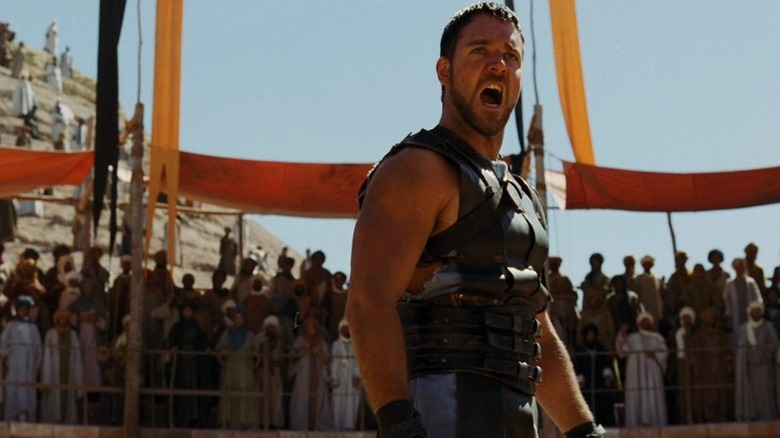
DreamWorks Distribution LLC / Universal Pictures
"Kingdom of Heaven" is not the only 2000s Ridley Scott film to fit snugly with "Troy" in the pantheon of muscular historical epics. As a matter of fact, Scott broke in the 21st century with another such movie and took home the Best Picture Oscar for his troubles. "Gladiator" stars an also Oscar-winning Russell Crowe as Maximus Decimus Meridius, a fictional Roman general in 183 A.D. who gets sold into slavery and becomes a gladiator during the rise to power of the ruthless Commodus (Joaquin Phoenix), son of Marcus Aurelius (Richard Harris).
True to Maximus' most famous line in the film — "Are you not entertained?" — "Gladiator" exemplifies blockbuster action at its best-crafted, be it in terms of narrative construction, compelling movie star acting, or just plain old rousing action. In addition to featuring a very similar aesthetic milieu to "Troy" (not 1:1, of course, but still, there's more than a little overlap between Ancient Rome and Ancient Greece), it's a great movie that ticks a lot of the same emotional boxes.
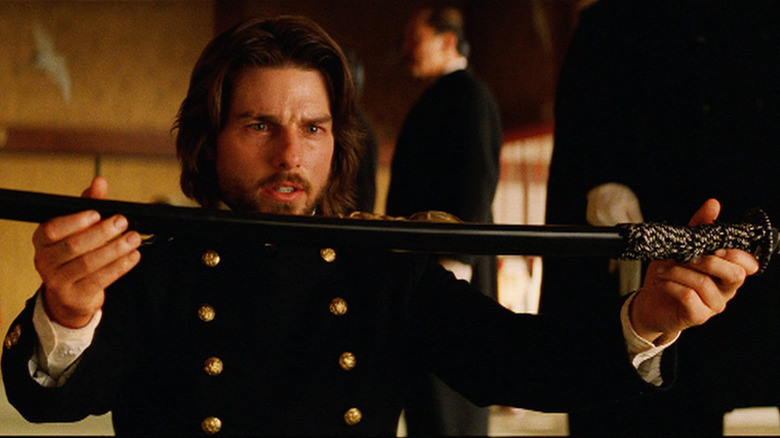
Warner Bros. Pictures
Directed by Edward Zwick and scripted by him alongside John Logan and Marshall Herskovitz from a story by Logan, "The Last Samurai" is a historical action film loosely based on the 1877 Satsuma Rebellion, with a protagonist freely inspired by real-life French Imperial Guard officers Eugène Collache and Jules Brunet. In the plot, former American cavalry regiment captain Nathan Algren (Tom Cruise) is tasked with training the newly-created Imperial Japanese Army to quell a samurai rebellion, but he winds up being captured by the samurai army. As prisoner, he gradually develops an intense connection with samurai culture and his allegiance begins to shift.
While its white American outsider's outlook on Japan certainly marks it as a relic of a different time, "The Last Samurai" is nonetheless one of the sturdiest and most engaging warrior epics produced by Hollywood this century — a film cut from the same cloth as "Troy" but more serious, adult-oriented, and dramatically hefty. Tom Cruise acquits himself well in the role of Algren, and the ensemble of Japanese actors around him, including an Oscar-nominated Ken Watanabe and later "Shōgun" star Hiroyuki Sanada, is even better.
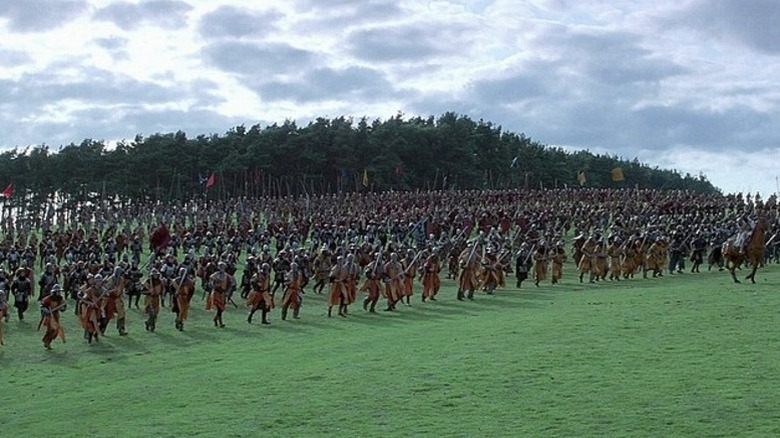
Paramount Pictures
The arguable grandfather of all contemporary historical epics, 1995's "Braveheart" is set amid the First War of Scottish Independence from England. The story, loosely inspired by a 15h-century Scottish epic poem, tells of William Wallace (Mel Gibson), a Scottish warrior whose wife and childhood friend Murron MacClanough (Catherine McCormack) is executed by the forces of Edward I of England a.k.a. Longshanks (Patrick McGoohan). This prompts Wallace to start a full-blown rebellion against the English crown.
It's easy to understand why "Braveheart" won Best Picture at the 1996 Academy Awards: Nearly three decades later, it still stands out as a mind-boggling marshalling of production resources in service of one of the most complete, fully-rounded action blockbusters in movie history. It may not exactly be a paragon of historical accuracy, but it's an undeniable classic. "Troy" almost certainly wouldn't exist without it and neither would a number of other films on this list.
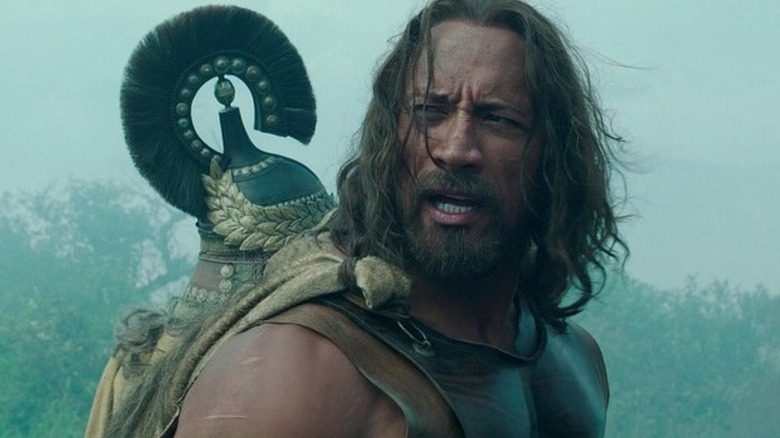
Paramount Pictures
One of the most high-profile cinematic adaptations of the Greco-Roman myth of Heracles, a.k.a. Hercules, 2014's "Hercules" stars Dwayne Johnson as the titular Greek warrior — whose status as the demigod son of Zeus is, in this telling, initially presented as self-proclaimed and ambiguous. Haunted by the deaths of his loved ones in what may or may not correspond to the legend of the Twelve Labors, Hercules leads a scrappy and charismatic band of mercenaries who get enlisted to train the forces of Thrace and prepare them to take on an offensive by the ruthless warlord Rhesus (Tobias Santelmann).
For a movie that had all the ingredients to be a clunking, bombastic, quickly-forgotten misfire — just look at what happened to the Kellan Lutz-starring "The Legend of Hercules," released the same year — this "Hercules" is surprisingly fun and solid. Essentially structured as an ensemble action film, with Johnson anchoring a vibrant cast of likable and committed stars, it shares with "Troy" the commonality of being Hellenic kitsch so earnest and sprightly as to be basically irresistible.
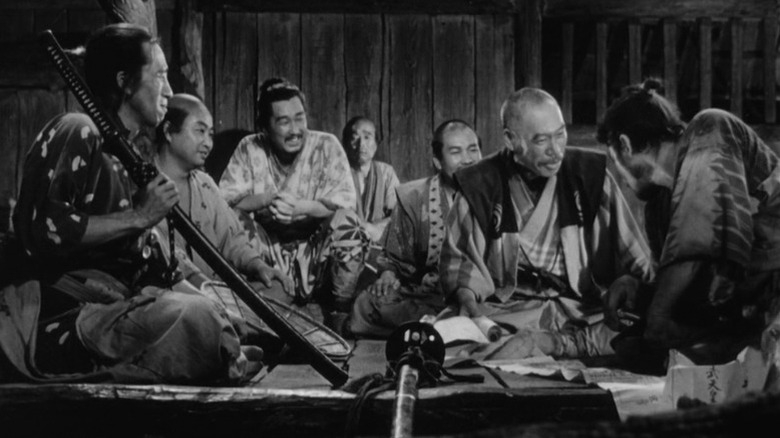
Toho / Columbia Pictures / Kingsley-International Pictures
Insofar as a single movie can be the blueprint for an entire genre, there's a strong case to be made for Akira Kurosawa's "Seven Samurai" as the picture that laid the groundwork for all the action-adventure cinema that came after it. The plot alone is so imitated that it will probably sound familiar if you haven't heard of it: In 1586, the people of an impoverished mountain village learn that they've been set as a target to be raided by a gang of bandits, so they set out in search of samurai who can come to the village and put up a defense. Ultimately, this brings seven samurai of wildly varied ages, backgrounds, and personalities together as the village's new protectors, and they begin to work with the populace to prepare for the impending battle.
If ever there was a three-hour movie that zips by effortlessly, it's this one: Kurosawa essentially invents, and then masterfully places, all the bricks of a thunderous, well-balanced, constantly gripping, emotionally sweeping modern blockbuster saga. It's yet another movie on this list that would definitely be detected in a genetic scan of "Troy," but here, that's an understatement — there's DNA of "Seven Samurai" in virtually all popular cinema made since.
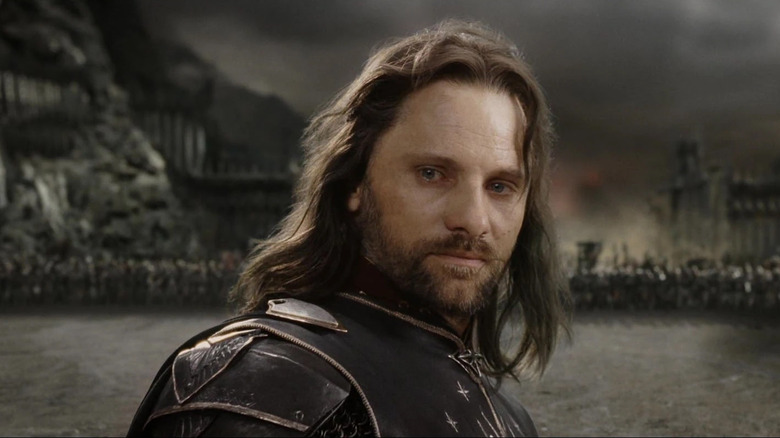
New Line Cinema
Peter Jackson's "The Lord of the Rings" trilogy became the fantasy franchise to rule them all when it made its way to theaters in three back-to-back installments between 2001 and 2003, and there still hasn't been anything like it since. Adapted from J. R. R. Tolkien's genre-defining high fantasy tome, the three "Lord of the Rings" films epitomize blockbuster filmmaking as a vessel for sheer imagination, bringing Tolkien's Middle-earth to life in such vivid, enveloping detail that its story of an epic quest to destroy evil in the throes of an inter-kingdom war comes to feel almost like historical record.
Aesthetically and narratively, it's maybe the key cinematic work that made up the pool of cultural reference from which "Troy" was drawing in 2004 — all the way down to similar marketing and posters, with an emphasis on Orlando Bloom once again stealing the show in a supporting role. There remains a world of difference between Jackson's Middle-earth and the fantastical Ancient Greece in "Troy," of course, but both movies understand the intrinsic appeal of whisking viewers off on a journey.
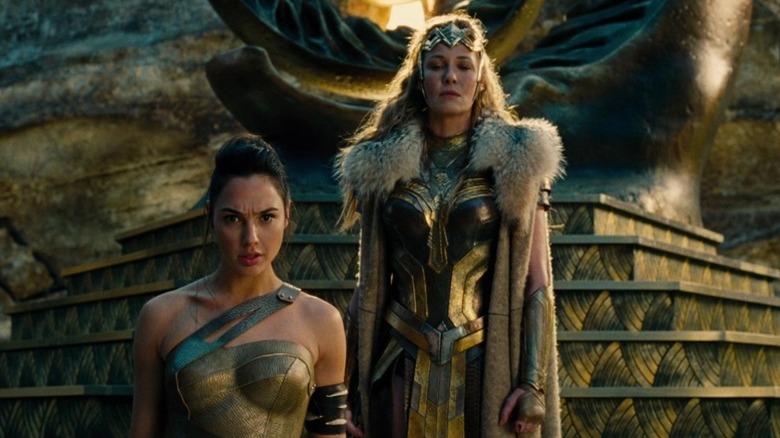
Warner Bros. Pictures
It's baffling to think that the first theatrical film centered on Wonder Woman — one of the world's most iconic and famous superheroes — didn't happen until the late 2010s, but at least the film to finally break the glass ceiling was worth the wait. Directed by Patty Jenkins, 2017's Wonder Woman acts as an origin story for Diana of Themyscira, a.k.a. Diana Prince a.k.a., Wonder Woman (Gal Gadot), going back to her time being raised among the Amazons. In 1918, shortly after Diana begins her training as a warrior, a plane carrying American pilot Steve Trevor (Chris Pine) crashes on the coast of Themyscira, bringing news of the war raging outside the island and ultimately prompting Diana to join Steve in the war effort against Germany.
There's plenty of Hellenic inspiration in the film's rendering of the Island of Themyscira, and even before she completes her hard-earned transformation into Wonder Woman, this film's Diana is as intrepid and mesmerizingly brave a warrior as Achilles in "Troy." Above all, though, "Wonder Woman" is just first-rate crowd-pleasing tentpole cinema with an old-fashioned penchant for mythmaking, awe, and spectacle — a movie that, in 2017, reminded audiences of what the blockbuster landscape looked like in the brighter, less gray days of the mid-2000s.








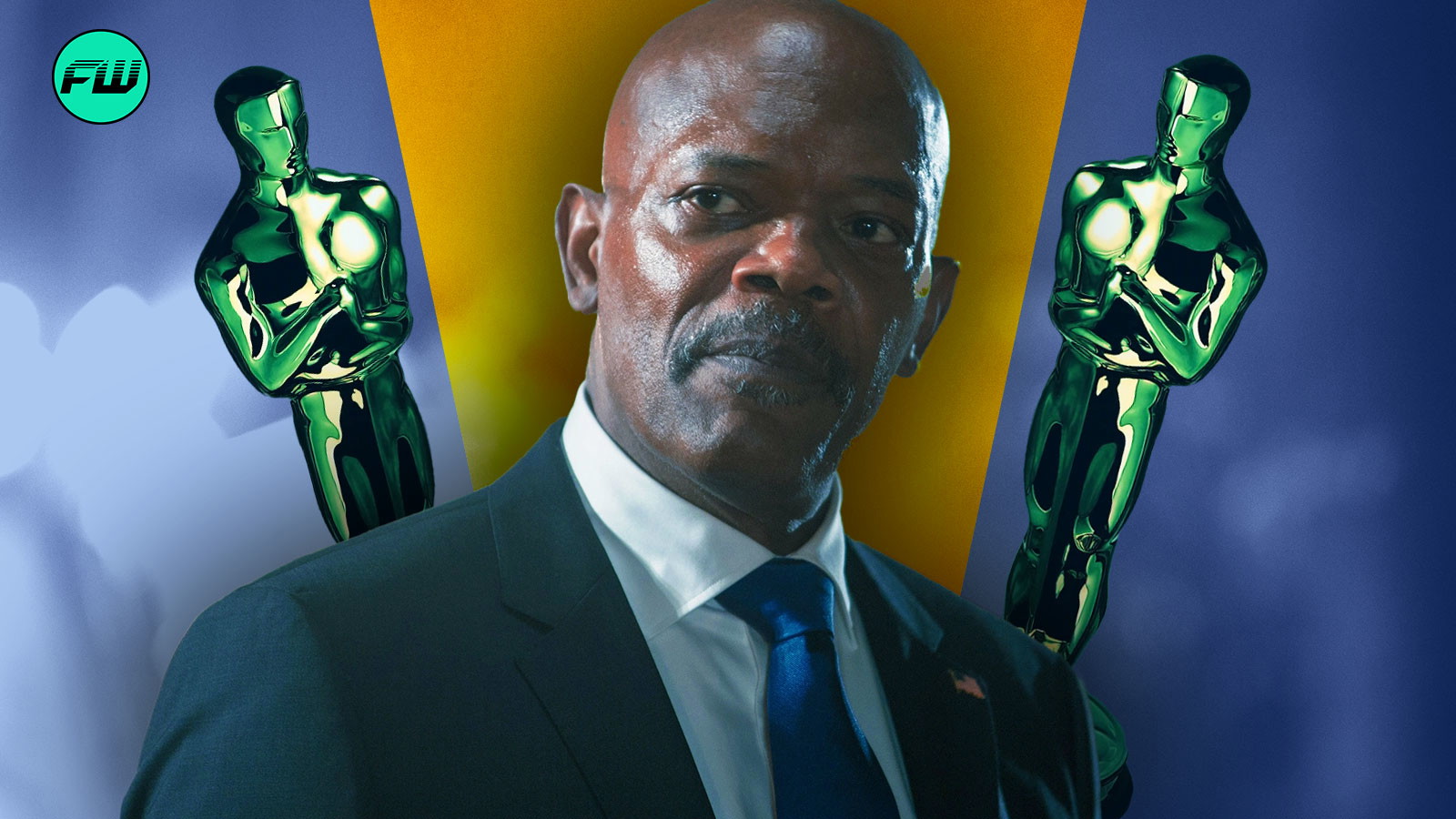

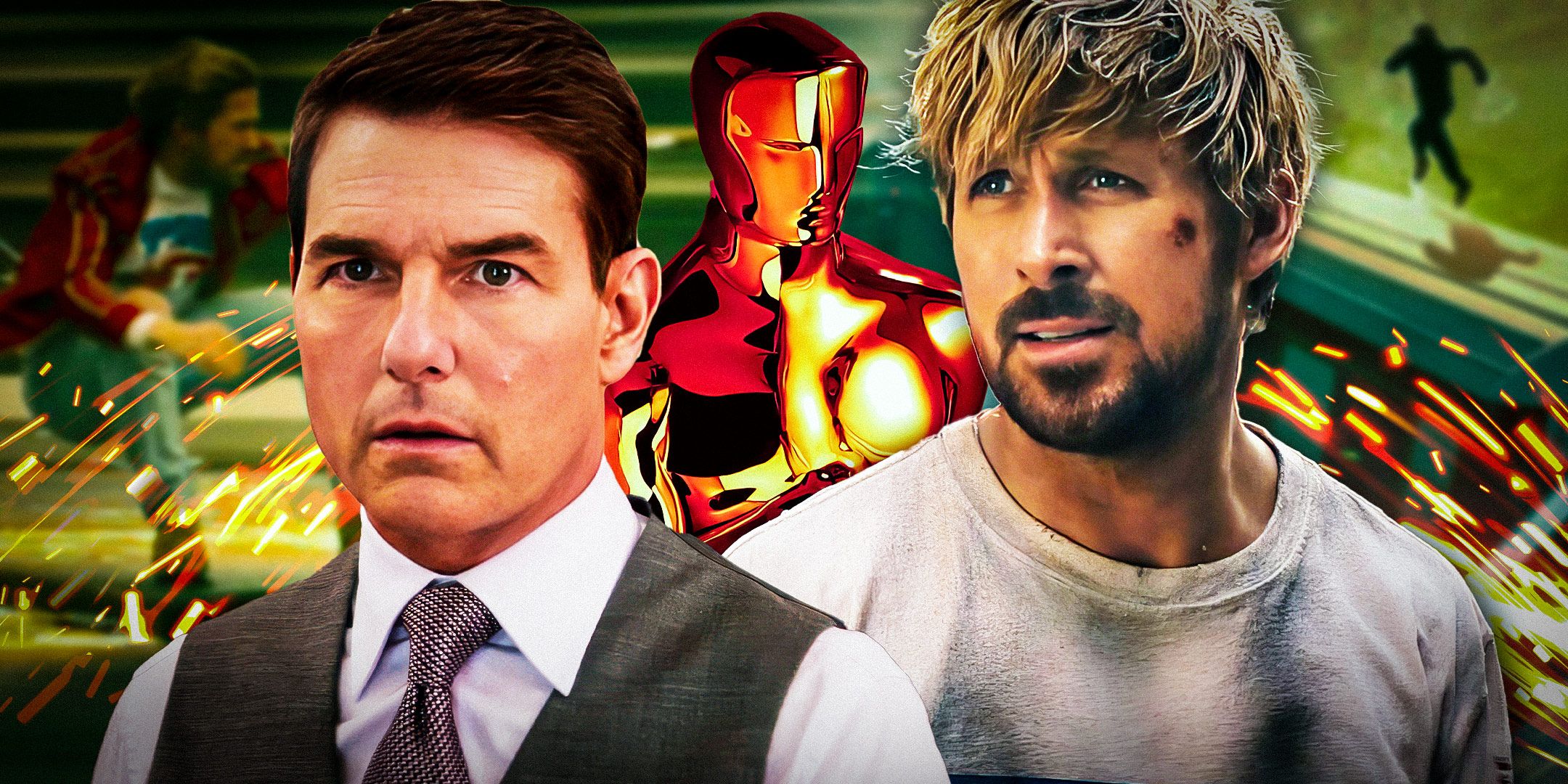
:max_bytes(150000):strip_icc()/Eva-Mendes-Ryan-Gosling-032724-565576902e504ce391f1fdc43d1d3c92.jpg)

